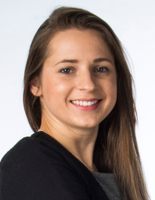 Year of Qualification
Year of Qualification
2010
Current Position
Plastic and Reconstructive Surgery Registrar, Welsh Clinical Academic Track (WCAT) Trainee, The Welsh Centre for Burns and Plastic Surgery
MRC Clinical Research Training Fellow and Academic Clinical Lecturer, ReconRegen Research Group, Swansea University Medical School
Career to Date
BA, MB BChir: University of Cambridge
Foundation Training: North West Thames Deanery
Core Surgical Training: London Deanery
Specialist Training in Plastic and Reconstructive Surgery: Wales Deanery
When did you decide to get involved in research and why?
Creating functional and durable tissue in the lab has the potential to shift the paradigm in reconstructive surgery by obviating the need for donor sites. It was the opportunity to get involved in translational field of tissue engineering that inspired me to undertake clinical academic training in Wales. The Royal College of Surgeons Research Fellowship provided the opportunity to gain enough data to be successful in getting a grant from the Medical Research Council to fund my doctoral studies on 3D bioprinting cartilage for facial
reconstruction. During my PhD, I have had the opportunity to get involved with basic science, state-of-the-art technology and clinical trials, providing real experience of bench to bedside research. This has highlighted that working with NHS, academia and industry to contribute towards innovations in patient care would be something I would value throughout my career.
What is your area of research interest?
• Tissue engineering
• 3D bioprinting
• Clinical trials
• Reconstructive Surgical Outcomes
How have you managed to combine clinical work with research?
I have been fortunate to receive excellent support and mentorship both clinically and academically. As a WCAT Trainee, I am funded to undertake 80% research and 20% clinical during my doctoral studies and 20% research for the rest of my surgical training.
Funding sources
• Medical Research Council
• RCS Fulbright Scholarship
• BAPRAS Pump Priming Fund
• RCS Cutler’s Surgical Prize
• RCS Research Fellowship
What are the benefits and challenges of being a clinical academic?
Benefits: The opportunity to respond to challenges in the specialty, collaborating with scientists and industry experts, working with new technologies, developing a field of expertise, bridging the clinical and academic divide.
Challenges: The constant juggling act!
Selected publications
Thomas D, Jessop ZM, Whitaker IS (Editors). 3D Bioprinting for Reconstructive Surgery:
Techniques and Applications. 1st Ed. London; Elsevier (2017).
Jessop ZM, Al-Sabah A, Gardiner MD, Combellack E, Hawkins K, Whitaker IS. 3D
bioprinting for reconstructive surgery: Principles, applications and challenges. J Plast
Reconstr Aesthet Surg. (2017) 70:1155-1170.
Jessop ZM, Al-Sabah A, Francis WR, Whitaker IS. Transforming healthcare through
regenerative medicine. BMC Medicine (2016) 14:115.
Jessop ZM*, Javed M*, Otto IA, Combellack EJ, Morgan S, Breugem CC, Archer CW, Khan
IM, Lineaweaver WC, Kon M, Malda J, and Whitaker IS. Combining regenerative medicine
strategies to provide durable reconstructive options: auricular cartilage tissue engineering.
Stem Cell Res Ther (2016) 7:19.
Jessop ZM, Al-Himdani S, Clement M, Whitaker IS. The challenge for reconstructive
surgeons in the twenty-first century: Manufacturing tissue-engineered solutions. Front Surg
(2015) 2:52.
(*equal contribution)